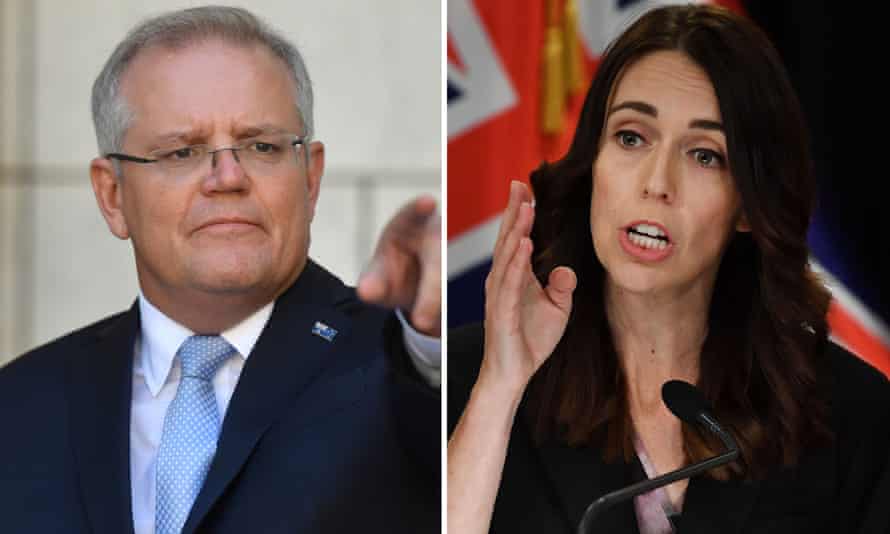Aotearoa has a proud history of protesting human rights abuses on the world stage. Now that means pushing back against our traditional trade partner
 Australian prime minister Scott Morrison and New Zealand prime minister Jacinda Ardern Composite: Getty Images/AFP via Getty Images
Australian prime minister Scott Morrison and New Zealand prime minister Jacinda Ardern Composite: Getty Images/AFP via Getty Images
Today a 15-year-old waits alone in a New Zealand quarantine facility, facing an uncertain future. Deported from Australia, he is not ordinarily resident here, and government agencies normally engaged for child protection are making plans for his care. Although Australia was his home, he was not Australian enough to be simply sanctioned in that nation for whatever infraction he is deemed to have committed.
This dehumanising treatment is what passes for necessary hard-line immigration policy in Australia. In its very high human cost, failure of binding child rights standards, and international criticism, it is very much in line with Australia’s longstanding approach to migrants, refugees and asylum seekers. Australia has been thought of as outside human rights norms and any moral standard of fairness for some time. In fact, our neighbour has been repeatedly found to be enforcing policy that amounts to literal torture on its offshore prison islands.
So when will New Zealand, and the rest of our so called “like-minded nations” in the international community, begin to treat Australia the way we would any rogue nation – to shame and sanction them into compliance with the international rules-based order?
The Convention on the Rights of the Child (UNCRC) is one of the most widely ratified international treaties. Australia and New Zealand have been parties to the UNCRC since the early 1990s, meaning both are legally bound not to treat children like adults in their criminal justice systems. Both countries are also required to put the best interests of every child first in decisions impacting their lives.
We don’t yet know what led Australian authorities to deem this young person not of good character, but what makes this case particularly heartbreaking is what we know about children’s experience of the New Zealand justice system. They do overwhelmingly suffer from mental health challenges and learning difficulties, exacerbated by a background of poverty or race-based discrimination in their access to care and support.
If we took every troubled child with a tenuous connection with another nation state and dumped them there alone, we would be in breach of vast moral and legal obligations we have to our children. Australia has callously taken that route this week.
Of course, 501 deportations to New Zealand are nothing new. I remember the first appearances of homeless or “transient” Australians seeping into our work at the Auckland District Court – people who had served their sentences back home, sanctioned again in immigration detention, and deported smugly by the Australian government. They had no community or cultural connections here – no close family. Our current prime minister has been upfront about her concern and criticism of Australia’s deportation policy and I expect she will raise this again with Australian leadership. Friends don’t let friends degrade their citizens.
But now our reaction must be commensurate to the full context of Australia’s behaviour as an international citizen. Australia’s 501 immigration policy is itself an extreme outlier in the world. But the treatment of Kiwis detained on Christmas Island, or this young person whose life has been turned upside most recently, cannot be divorced from its prison islands on Manus and Nauru.
We know, because Amnesty International and even the United Nations have repeatedly told us, that the treatment of asylum seekers and refugees by Australia amounts to torture. These are not radical institutions who use that term easily or often. When Australian medics began to report the horrors of sexual violence and abuse in the prison camps, Australia criminalised their ability to speak rather than to prevent that abuse. Refugees who have fled war, torture, and persecution have been driven to suicide by the conditions in the prison camps. There have been 12 preventable deaths, including by murder at the hands of guards.
Aotearoa New Zealand has always been at our best as an independent principled voice on the world stage, standing firm against atrocity and abuse of international human rights standards, no matter who is responsible. Protesting apartheid in South Africa and facing off against the United States over our Nuclear Free policy are proudly held in our national ethos. We stood then on the right side of history – on clear moral issues that the rest of the western world struggled with.
This is another such moment. If Australia was not a “traditional ally” or major trading partner, we would raise their violations with all the force of our diplomatic might – “punching above our weight” in international forums. We must consider all diplomatic means and sanctions available to bring Australia to order, and ask our allies and regional partners to support us.
Treating Australia like we would any other rogue nation who is routinely and openly committing abuses as serious torture against the world’s most vulnerable is a moral and legal duty. It would be an essential act of recognition for the rights and dignity of the young person suddenly in our care, and it would be a declaration that western, so-called “developed” nation states can (and often do) flout the best interests of our global community – that they are not above the laws and standards that seek to ensure our collective peace and security. And in that way, through this latest heart-breaking case, New Zealand could set an invaluable example.
Post Views: 1,780

